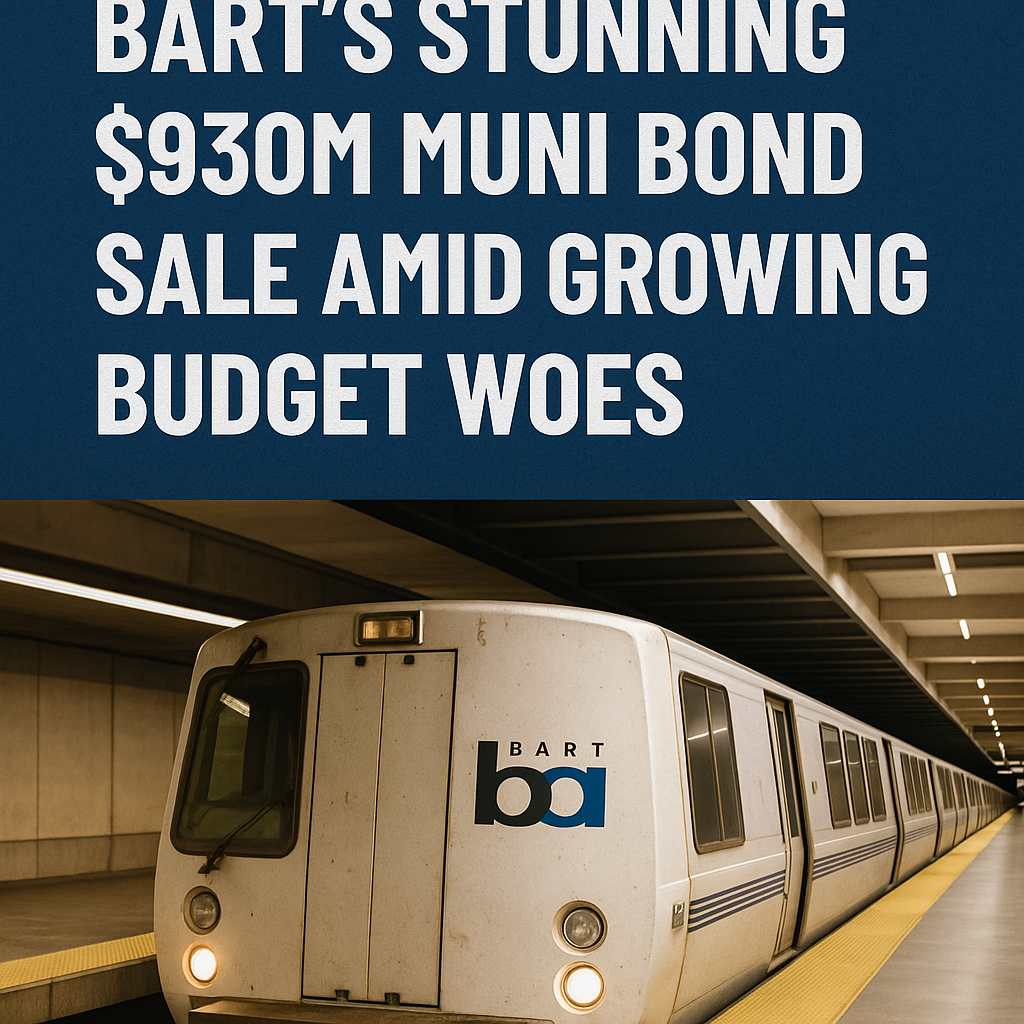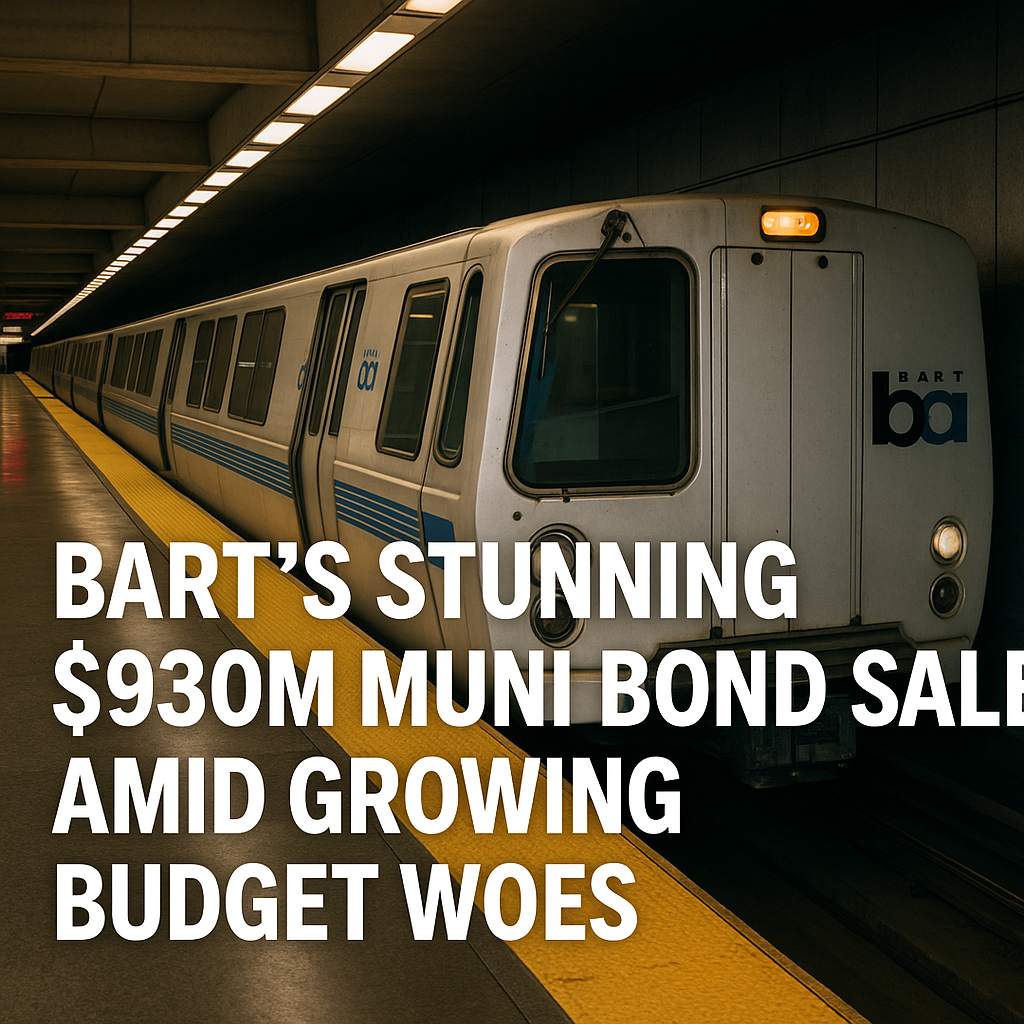BART’s Stunning $930M Muni Bond Sale Amid Growing Budget Woes
BART’s Stunning $930M Muni Bond Sale Amid Growing Budget Woes
BART’s stunning $930 million muni bond sale is raising eyebrows as the transit agency grapples with significant budgetary challenges. As public transportation systems across the nation face fiscal pressures exacerbated by COVID-19 and changing ridership patterns, BART’s latest financial maneuver sparks discussions about the sustainability and future of transit funding.
Financial Necessity and Strategic Moves

The enormity of the $930 million bond sale stems from a pressing need for funding amid projections of budget deficits in the coming years. According to sources from the Mercury News and SFGate, this bond sale is critical for BART to fund necessary infrastructure improvements, modernize systems, and potentially stave off future deficits.
Balancing Act: Investment vs. Debt
As BART prepares to proceed with the bond sale, the agency aims to address immediate financial concerns while ensuring long-term viability. The proposed funding will not only facilitate upgrades to aging infrastructure but also support projects aimed at enhancing operational efficiency.
Interestingly, the decision to pursue such a significant bond sale is not without contention. Critics point out that relying heavily on debt could create a precarious fiscal situation. As BART continues to see fluctuating ridership levels, primarily attributed to shifts in commuting patterns after the pandemic, concerns about future revenue streams have been amplified.
– Pros of the Bond Sale:
– Immediate funding for critical infrastructure upgrades.
– Potential to attract investors seeking stable returns in urban transit.
– Opportunity to enhance rider experience, possibly leading to a rebound in ridership.
– Cons of the Bond Sale:
– Increased debt burden to be managed.
– Uncertainty regarding future revenues as remote work persists.
– Risk of overextending financial obligations during a transitional period.
Diverse Perspectives on Future Viability
Engaging with various viewpoints reveals a complex landscape regarding fiscal decisions at BART. Some advocates argue that this bond sale is a necessary step towards revitalizing the Bay Area’s public transport system. They maintain that investing in infrastructure may ultimately lead to increased ridership, countering the trend of declining passenger numbers.
Conversely, skeptics—particularly fiscal analysts—express concern over the sustainability of BART’s long-term financial strategy. As mentioned in articles from both the Mercury News and SFGate, they posit that while immediate funding needs are clear, the inherent risks associated with accumulating debt could haunt the agency in the years to come.
Balancing Risks with Opportunities
It’s essential to recognize that the diverse perspectives stem from real concerns about how public transport is funded and modernized. Policymakers and transit authorities must carefully navigate this fiscal landscape, ensuring they find an equilibrium between short-term exigencies and long-term fiscal health.
– Consideration of Ridership Trends: As commuting habits continue to evolve, BART will need to rethink its strategies for attracting riders back to the system. This includes offering services that align with the needs of a post-pandemic workforce and improving overall safety and accessibility.
– Investment in Technology and Infrastructure: Future success hinges on modernizing technology and infrastructure to streamline operations and enhance passenger experience. Investing in new systems could ultimately lead to operating cost reductions, which would alleviate some debt pressures.
The Road Ahead
As BART moves forward with its $930 million muni bond sale, it finds itself at a critical juncture. Strategic investments must be balanced with prudent fiscal management to avoid shackling future budgets with debt. The integration of modern solutions and a robust engagement strategy with the public will also play a pivotal role as BART navigates these uncharted waters.
The discussion surrounding BART’s financial strategy amid its commitment to improving public transit is not merely an issue of numbers but one that impacts the entire Bay Area community. As public transportation seeks to adapt to an evolving societal landscape, it is clear that open dialogue and a keen understanding of fiscal realities will be critical to its success.
In conclusion, while the $930 million muni bond sale may appear to be a decisive action for BART, the implications of this decision will resonate well into the future. As BART confronts the challenges of balancing immediate needs with long-term viability, it will be crucial to foster ongoing conversations about funding, infrastructure, and the very nature of public transportation in a changing world.








